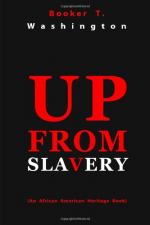
|
| Name: _________________________ | Period: ___________________ |
This test consists of 15 multiple choice questions and 5 short answer questions.
Multiple Choice Questions
1. When the author writes about the condition of the school he oversees in Tuskegee, what does he say about an umbrella?
(a) There is only one umbrella available to the class, and students take turns using it.
(b) On rainy days, a student holds an umbrella over Booker's head because the classroom leaks.
(c) On "Teacher Appreciation Day," the students collect just enough money to buy Booker a gift of an umbrella.
(d) When Booker's umbrella tears in a violent storm, there are no funds available for a replacement, so he patches it up.
2. What does Booker comment about the schools in Tuskegee?
(a) Most are well equipped but their teachers need better training.
(b) Most are poorly equipped and their teachers are not properly prepared.
(c) Most are poorly equipped but boast top-notch teachers.
(d) Most are well equipped and have good teachers.
3. What do Booker and his co-teacher at Tuskegee agree they need to add to their curriculum?
(a) Hygiene.
(b) Latin.
(c) Music.
(d) Agriculture.
4. Among the unnecessary excesses that he describes for the families of Tuskegee living in poverty, what does Booker include?
(a) Owning an expensive organ that is rarely played.
(b) Serving guests an elaborate meal when a simple one will do.
(c) Buying expensive silk ties and dresses that are rarely worn.
(d) Owning books when they can be borrowed from the library instead.
5. On his way to Hampton, Booker stops at Richmond to earn money for the remainder of his journey. What work does he do in Richmond?
(a) Unloads a ship.
(b) Paints a building.
(c) Delivers groceries.
(d) Digs ditches.
6. As a child, Booker lives in a cabin that also serves as:
(a) The plantation's kitchen.
(b) The community's meeting hall.
(c) A garden tool storage shed.
(d) A chicken coop.
7. When Booker travels with a young Indian boy who is ill, how are they treated by outsiders?
(a) Booker is accepted into establishments that the boy is not allowed to enter.
(b) They are rejected by everyone they seek help from.
(c) They are welcomed by everyone they seek help from.
(d) The boy is accepted into establishments that Booker is not allowed to enter.
8. What does Booker nickname the night school he teaches at Hampton?
(a) The Night Owls.
(b) The Midnight Crowd.
(c) The Plucky Class.
(d) The Brave Scholars.
9. In the chapter "Boyhood Days," what does Booker say he does in order to get to school on time?
(a) Skips breakfast.
(b) Wakes up earlier than the rest of his family.
(c) Changes the clock at work.
(d) Runs the entire distance to school.
10. When the Emancipation Proclamation is read to slaves, freeing them immediately, what does Booker say they consider after their initial celebration?
(a) They wonder if they're being told the truth.
(b) They wonder where they will live and what work they'll do.
(c) They don't trust the masters to abide by the new law.
(d) They ask themselves what state they should move to.
11. During the winter months, Mrs. Ruffner allows Booker to spend an hour a day doing what?
(a) Taking a lunch break.
(b) Socializing with friends.
(c) Attending school.
(d) Learning to play the piano.
12. After his first year at Hampton, where does Booker work during the summer?
(a) Restaurant.
(b) Library.
(c) Farm.
(d) Circus.
13. What is Booker's brother's name?
(a) Benton.
(b) Bill.
(c) Jeremiah.
(d) John.
14. As he travels to Hampton, the author arrives in Richmond, Virginia, flat broke and spends the night where?
(a) In a barn.
(b) In a church.
(c) Under a drawbridge.
(d) Under a boardwalk.
15. Booker states that in addition to receiving book knowledge in school, former slaves should be taught:
(a) Practical skills, like cooking.
(b) That they can succeed in their new circumstances.
(c) How to look for and interview for a job.
(d) That doing manual labor is not shameful.
Short Answer Questions
1. Booker's class at Tuskegee quickly grows to how many students?
2. The Reconstruction Period refers to the:
3. What do most of the farmers in Tuskegee grow?
4. The author notes that many people who got an inkling of education became:
5. As a young boy, one of Booker's jobs is what?
|
This section contains 695 words (approx. 3 pages at 300 words per page) |

|




